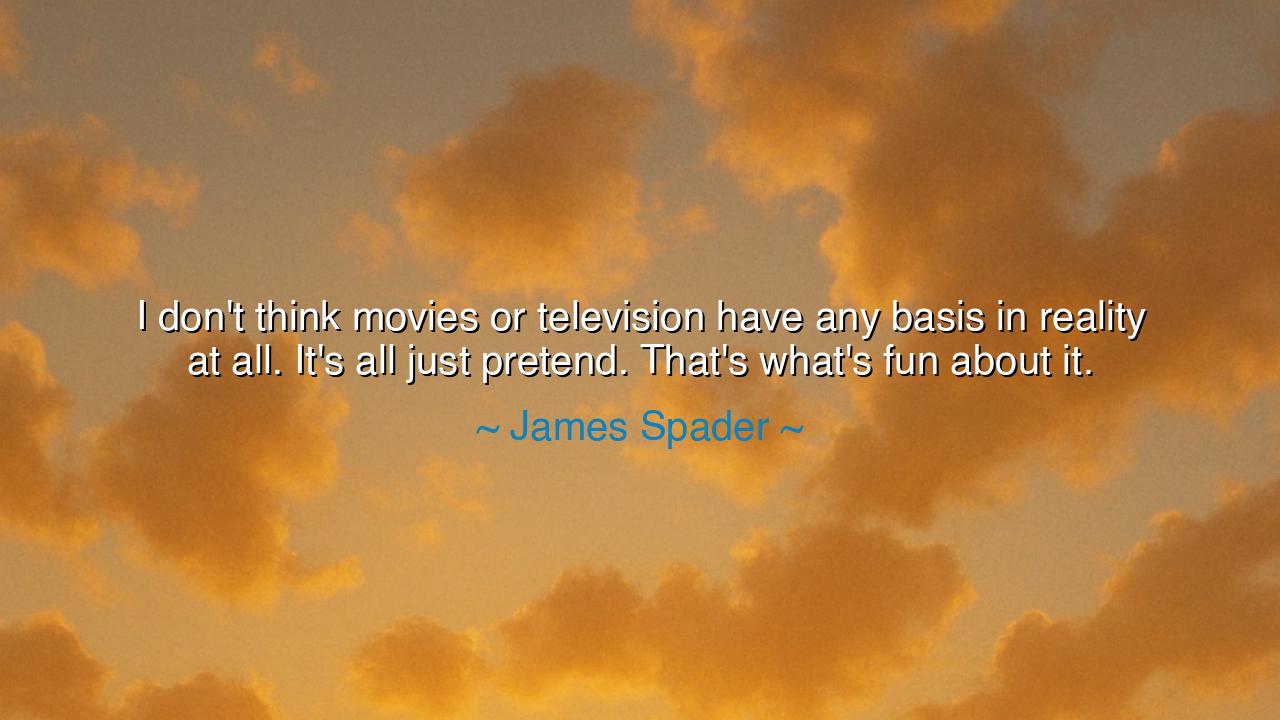
I don't think movies or television have any basis in reality at
I don't think movies or television have any basis in reality at all. It's all just pretend. That's what's fun about it.






Hear, O lovers of story and seekers of wonder, the words of James Spader, who declared: “I don’t think movies or television have any basis in reality at all. It’s all just pretend. That’s what’s fun about it.” With these words he unveils a truth about art that is both ancient and liberating: that storytelling is not bound to the rigid stones of reality, but takes flight in the endless skies of imagination. He speaks of the joy of pretend, of the sacred play in which mankind has always engaged to reflect, to explore, and to dream.
The meaning is this: though movies and television may borrow the garments of reality, they are at heart illusions, crafted visions woven by artists. They are not chains meant to bind us to what is, but wings to carry us to what might be. Spader celebrates this, reminding us that the power of stories lies not in their factual truth, but in their ability to transport, to delight, to make us laugh and tremble in worlds that exist only in the mind. For in the realm of art, the fact of reality is less important than the truth of experience.
The ancients themselves knew the sanctity of pretend. The poets of Greece sang of gods who took human form, of heroes who fought monsters, of journeys across seas that shimmered with both danger and wonder. None believed that Odysseus truly battled a one-eyed giant upon an island, yet all were nourished by the tale, for in its pretend they saw the deeper truth of endurance, cunning, and the longing for home. So too does Spader remind us: the joy of art is not that it mimics the world, but that it invents new ones in which we may glimpse ourselves more clearly.
History also bears witness in the tale of Shakespeare, who filled the stage with kings and fools, ghosts and fairies. Did the groundlings in London believe they were truly beholding the spirit of Caesar, or that forests could walk to battle in Macbeth’s tragedy? No. They knew it was pretend, but it was in that very pretending that they found catharsis, laughter, and wisdom. The stage became a mirror of life precisely because it was not bound by life’s limits. So too do film and television serve not as photographs of the real, but as dreamscapes of the possible.
Spader’s joy in the falsehood of art carries also a lesson for the spirit: to embrace playfulness as a vital force. Too often the world burdens us with seriousness, demanding that every act be weighed with reason, every story bound to truth. Yet to pretend is to remember the child within us, the one who turned sticks into swords, rooms into castles, shadows into dragons. To reclaim that joy is to refresh the soul, to remember that imagination is not an escape from life, but a renewal of it.
Let the lesson be this: do not despise the pretend, for within it lies truth of a different kind. Watch the films that dazzle you, even if they make no claim to reality. Delight in stories that defy logic, for they reveal the boundless creativity of the human spirit. And in your own life, do not be afraid to play, to imagine, to create worlds in your mind and in your work that lift you above the dust of daily struggles. For pretending is not falsehood—it is the soul’s rehearsal for greatness.
What, then, should you do? When life presses you with weight, turn for a time to the stories that let you breathe. When others scoff at the fantastical, remember that the greatest truths are often spoken in the language of make-believe. And when you create—whether in art, in speech, or in daily acts—dare to infuse it with imagination, not merely repetition of what already is. In so doing, you will find the joy Spader celebrates: the freedom of living in worlds both real and imagined.
Thus let his words echo: “It’s all just pretend. That’s what’s fun about it.” For the ancients knew, and the artists of every age remind us, that in pretending we find not escape but revelation. Pretend is the golden thread that binds the child to the sage, the stage to the world, and the fleeting moment to eternity. Cherish it, and you shall live not only in the narrow cage of reality, but in the wide and wondrous expanse of imagination.






AAdministratorAdministrator
Welcome, honored guests. Please leave a comment, we will respond soon